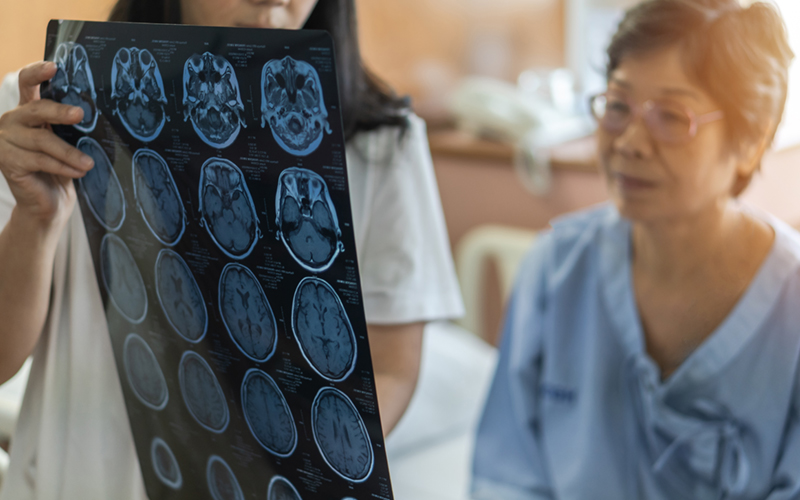Rancho Cucamonga Traumatic Brain Injury Attorney
- 550+ Google 5-Star Reviews
- $1 Billion won over 15 years
- Won’t settle for low offers, not afraid to fight for max value

Get a Free Case Evaluation
No fees until we win!
All San Diego Case Types

Personal Injury

Brain Injury

Car Accident

Slip & Fall

Truck Accident

Wrongful Death
Rancho Cucamonga Traumatic Brain Injury Attorney
With its proximity to major transportation hubs and the bustle of the Los Angeles area, there is plenty to do in Rancho Cucamonga. Unfortunately, with all of the available activities, there are many opportunities for injury. One of the most severe injuries is a brain injury, as the brain is the organ that controls all of the body’s voluntary and involuntary responses.
If you or your loved one suffered a brain injury in Rancho Cucamonga that resulted from someone else’s careless or reckless actions, read on for more information about the expenses and impacts incurred by this injury and how you can recover damages related to your injury.
You may also contact the dedicated Rancho Cucamonga traumatic brain injury lawyers at Gomez Trial Attorneys today to talk about your specific situation and your legal rights. We’re always willing to listen to your story and see what we can do to help you.
WHAT IS A TRAUMATIC BRAIN INJURY?
Acquired brain injuries change how the brain functions.
There are two types of acquired brain injury:
- Traumatic brain injuries: This type of acquired brain injury is typically the result of a jolt, bump, or blow to the head or body. Common causes of traumatic brain injuries include a fall from the same level or elevation; motor vehicle accidents including those that involve cars, trucks, buses, motorcycles, bicycles, pedestrians, aircraft, or watercraft; violence such as assault, domestic violence, or child abuse; high-risk sports or recreational activities including soccer, football, diving, or surfing; and military combat and training exercises.
- Non-traumatic brain injuries: This type of brain injury generally results from oxygen deprivation, electric shock, drug overdose, exposure to substances such as carbon monoxide or lead paint, and near-drowning or choking. Medical conditions such as strokes, tumors, or seizures can also cause this type of injury.
Brain injuries can take place within the skull (closed head injuries) or they can occur due to an object penetrating the hard protection of the skull (a penetrating head injury). Because the brain has only a limited ability to heal itself from damage, many of the disabilities caused by the injury are permanent. The type of disabilities experienced by the brain injured person can vary wildly, depending on the severity of the injury and the portion of the brain that was injured.
Some of those disabilities can include:
- Difficulty controlling emotions, behavior, or impulses.
- Loss of memory.
- Difficulty speaking or understanding spoken language.
- Trouble with the five primary senses of touch, taste, smell, sound, and sight.
- Loss of the ability to balance or produce coordinated movement.
- Blindness or loss of the ability to perceive the size and shape of objects.
- Inability to control the body’s involuntary responses, including temperature regulation, breathing, heart rate, or sleep/wake cycles.
When an individual arrives at the emergency department or hospital with a brain injury, a doctor may perform tests to determine the severity of the injury. Brain injuries are defined as “mild,” moderate, or severe, depending on the presentation of initial symptoms. However, even so-called mild brain injuries, such as concussions, can produce permanent deficits, including memory loss, psychological reactions such as depression or anxiety, and chronic pain.
COMMON COMPLICATIONS RESULTING FROM TRAUMATIC BRAIN INJURIES
 Brain injuries pose a high risk of complications that can require further medical treatment or can even result in additional damage to the brain or death. Many of these complications present in the early hours or days after the injury takes place, though some can linger for months or even years. Common complications of brain injuries include:
Brain injuries pose a high risk of complications that can require further medical treatment or can even result in additional damage to the brain or death. Many of these complications present in the early hours or days after the injury takes place, though some can linger for months or even years. Common complications of brain injuries include:
CONSCIOUSNESS DISORDERS
Consciousness is the act of being awake and aware of one’s surroundings. The level of consciousness exhibited by the brain injured person is one of the first factors evaluated in the treatment of brain injuries. Severe brain injuries are defined, in part, by a coma, which is the loss of consciousness for more than 24 hours.
Other consciousness disorders include:
- Vegetative states: A vegetative state is a coma that lasts longer than 24 hours. In this state, the person is unaware of his or her surroundings, but can open his or her eyes, make sounds, and even exhibit some reflexive responses.
- Minimally conscious states: Sufferers of this condition have limited but notable awareness of surroundings. Often a minimally conscious state is regarded with optimism as it can be the transition between a coma and wakefulness and can indicate improvement in the injured person’s condition.
- Brain death: Brain death occurs when there is no measurable activity in the brain, including the brainstem which is responsible for the body’s involuntary responses such as breathing, body temperature, and heart rate. This often irreversible condition can result in the removal of life support so that physical death can occur.
SEIZURES
Seizures are often experienced when the injury occurs, but can also take place during treatment of the injury. Sometimes, a brain injured individual will experience recurring seizures after the injury, even months or years later. This is referred to as post-traumatic epilepsy, and can occur regardless of the severity of the injury. Many brain injured patients will be administered anti-seizure medication as part of early treatment to avoid the potential worsening of the damage to their brain that can be caused by the seizure.
HYDROCEPHALY
Hydrocephaly is a buildup of cerebrospinal fluid in the brain. This can cause the brain to swell within the skull, which increases pressure and can result in further damage. Often, a shunt will be surgically placed early in treatment to drain this excess fluid from the brain into other parts of the body.
INFECTIONS
Infections are particularly common after penetrating head injuries in which an object pierces the skull and introduces bacteria into the protective tissues surrounding the brain. Infections can also be the result of surgeries and altered consciousness that renders the brain injured person unable to explain that he or she is not feeling well. Those with penetrating brain injuries are often provided an early dose of antibiotic medication to prevent an infection from occurring.
Many times, the first sign of an infection is a fever. While doctors may immediately suspect infection as the source of fever, a temperature can increase because of damage to the part of the brain that regulates body heat.
BLOOD CLOTS
 Blood clots are another common complication that can occur shortly after the injury takes place, or even months or years later. The damage sustained to the brain as the result of an accident does not just occur to the brain itself, but also to the vessels that provide blood to the organ. This damage can result in blood clots and can increase the potential for issues such as strokes.
Blood clots are another common complication that can occur shortly after the injury takes place, or even months or years later. The damage sustained to the brain as the result of an accident does not just occur to the brain itself, but also to the vessels that provide blood to the organ. This damage can result in blood clots and can increase the potential for issues such as strokes.
Blood clots can also form in the deep veins of the legs or arms as a result of immobility and surgical procedures used to treat the injury. The danger of this type of clot is that a piece of the clot can break free and travel through the bloodstream to the lung. This potentially fatal condition is known as a pulmonary embolism.
HETEROTOPIC OSSIFICATION
This condition occurs when changes to the brain’s function result in the development of new bone tissue in areas where bones are not generally located. Areas of the body that can experience this condition include hip or shoulder joints. This can result in pain, inflammation, and loss of range of motion to the affected area. Surgery is sometimes required to remove the bone tissue that has grown as a result of the injury.
SEXUAL ISSUES
Both brain injured men and women can experience changes in sexual appetite or even preference as a result of hormonal changes relating to the injury. Other issues can include changes in lubrication for women, and changes in the ability to achieve or maintain an erection for men. The injury can also result in a loss of fertility for individuals of either gender.
THE IMPACTS OF TRAUMATIC BRAIN INJURIES
Brain injuries can have profound effects on every facet of the injured person’s life, including:
- At work: Many individuals cannot return to work due to the extreme changes in behavior and impulse control, memory, and mobility that occur as a result of brain injuries. Others can do some type of work, though not the same work or at the same capacity as before the injury. Those who return to the job they held before their accident are often required to take longer breaks, work fewer hours, and handle a lighter workload as a result of fatigue, which is commonly experienced after a brain injury.
- At school: Children who suffer a brain injury generally do not recover any faster or more completely than adults. It may take many years to fully realize the impact of the injury as the child develops and societal expectations increase. Brain injured children often need the assistance of a paraprofessional and other accommodations to obtain a meaningful educational experience.
- At home: The home life of the brain injured person is often forever altered, with parents, spouses, and children expected to provide care and assist the injured person with daily personal care tasks. The injured person’s spouse can experience a loss of consortium, which is the loss of physical intimacy and companionship commonly present after this type of injury.
- In society: Brain injured individuals often find that they have little in common with the friends they enjoyed activities with before the injury. Many pre-injury hobbies are not possible for the person after suffering a brain injury, due to the behavioral and mobility issues presented.
TRAUMATIC BRAIN INJURIES: AN EXPENSIVE PROPOSITION
Medical expenses for the treatment of brain injured individuals throughout their lifetime can range between $85,000 and $3 million. Treatment is often hampered by this high cost, as the injured person can’t work and can lose the health care benefits provided through employment. About 53 percent of the U.S. homeless population is living with a brain injury that was either caused by the dangerous conditions of homelessness or was the reason for becoming homeless.
DID YOU SUSTAIN A TRAUMATIC BRAIN INJURY IN RANCHO CUCAMONGA? LET US HELP
If you have suffered a brain injury in Rancho Cucamonga someone else’s reckless or careless actions caused, you could recover compensation through a brain injury lawsuit filed in civil court.
Some damages that you could recover through this type of legal action include:
- Medical expenses, including estimated expenses to treat future complications.
- Wages that are lost due to being too injured to work.
- Loss of future earning capacity if the brain injury results in permanent disabilities that make it impossible for the individual to ever return to work.
- Property damage sustained in the accident, such as the cost to replace or repair a vehicle damaged in a car accident that caused the brain injury.
- Physical pain and suffering.
- Emotional distress.
- Loss of consortium.
- Loss of the enjoyment of life.
When pursuing the recovery of damages through a lawsuit, seek the guidance of a Rancho Cucamonga brain injury lawyer at Gomez Trial Attorneys who not only knows the legal process, but also understands the extraordinary impacts that individuals with brain injuries experience.
Let the lawyers at Gomez Trial Attorneys help you understand your options for recovering damages related to your brain injury. For a free case evaluation, contact us online or by calling (619) 237-3490.
Our Process... Easy as 1. 2. 3!
Call Us
We will determine your case and submit
We get to work
You will get regular update from us
Win
Collect your compensation

550+ 5 Star Reviews
-
“John helped me find doctors, he referred me to his neurologist, his physical therapist, I mean, anything I needed he was right there, every step of the way. I couldn’t have asked for a better result from all of this, I would absolutely recommend Gomez Trial Attorneys.”
-
“During the time I was working with Gomez Trial Attorneys, they treated me very, very well. 100% of the time, they believed me, and they were very compassionate. They felt sorry for what happened and they understood the therapy process.”
-
“They held my hand the whole time and kept me in the loop every aspect of my case which was very refreshing to me. They helped me get my settlement offer as fast as possible and I was able to keep my farm”
-
“The Gomez experience was the best experience it could be for me really, only positive things to say. They really were there every step if the way. Thanks to Gomez Trial Attorneys my dad is able to support my family as a single father”
-
“He opened the door for me to join his firm to help other brain Injury survivors and I never met another firm who is like this who was so understanding and caring who took the extra step and walked the extra mile with their clients and this is the best”
-
“I am very satisfied with the outcome with Gomez and I would definitely recommend Gomez to anybody, we tell people all the time, Get Gomez! They are really thorough with everything and they make you feel real comfortable.”
-
“Just helped us through, guided us through, I kept notes all those years, we had questions all the time and they would always keep us informed of what was going on. They just unlayered it, layer by layer, I’ve never seen anything like them. Thank God for them.”


